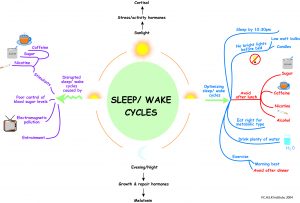Hi there. In this article, we will show you some tips you can use to maintain a healthy sleep/wake cycle all by yourself. However, if you feel the situation is out of hand, you should consult your doctor.
What is the sleep/wake cycle?
The sleep/wake cycle is the daily pattern determining the time to go to sleep and the time when one should wake up. For most people, the ideal cycle includes 7 to 9 hours of sleep at night and 15 to 17 hours of wakefulness.

Why is getting proper sleep important?
Our sleep/wake cycle can determine our health, and a healthy sleep/wake cycle is important to perform effectively throughout our day.
Getting an adequate amount of sleep at night is essential because sleep is important for many vital functions such as-
- Overall development
- energy conservation
- Modulating an immune response
- Healing
- Vigilance
- Performance throughout the day
- Clearing brain waste
- Maintaining a healthy psychological state

Clearly, maintaining a healthy sleep/wake cycle is essential to living a healthy and fulfilling life. A lot of people, like students, are unable to get proper sleep at night and often are unable to perform at their best during the day. Getting proper sleep is vital to maintain a good focus on studies and perform well in exams.
The sleep/wake cycle is also known as the circadian rhythm and can get thrown off due to the following reasons-
- Jet lag
- Night shift work
- Pulling all-nighters
There are a few tips you can follow to maintain a healthy sleep/wake cycle
Tips to maintain a healthy sleep/wake cycle
The sleep/wake cycle is controlled by a hormone called melatonin, secreted by the pineal gland, situated close to the hypothalamus of the brain.
Melatonin serves the following functions-
- Regulation of sleep/wake cycle
- Regulation of blood pressure, etc.
Production of melatonin is controlled by light entering the eyes. Light conditions lead to decreased production of melatonin while dark conditions lead to increased activity of melatonin.
Melatonin activity peaks when a person is asleep. Since the production of the hormone is hampered in night-shift workers, their sleep/wake cycle is highly disrupted.
By using the tips given below, you can regulate your sleep/wake cycle by controlling light entering your eyes thus controlling your melatonin activity.
1. Make sure you sleep in a completely dark environment
The sleep/wake cycle is highly dependent on exposure to light. Turn off the lights, and even cover your windows with blinds or curtains if you have to. Make sure that there is no light entering your eye. Dark conditions lead to increased production of melatonin and thus leading to better sleep.
2. Make sure you get enough light in the morning
When you wake up, make sure enough light enters your eyes. To be more alert and avoid going back to sleep, turn on the lights in your room. If you cannot turn on the light, go outside and let the natural light do the trick.
3. Do not use your phone at night time
Yes, your parents are right about this one. Using your phone at night exposes your eyes to light at night time. Thus, leading to prolonged exposure to light and decreased melatonin production. This is why you do not feel sleepy at night as there is light already entering your eye making you alert. This is important to maintain a healthy sleep/wake cycle.
4. Turn on blue light filters in your devices.
The ipRGC- intrinsically photosensitive Retinal Ganglion Cells, present in your retina are most sensitive to blue light. They play a major role in synchronizing sleep/wake cycles to the 24-hour light/dark cycle, providing primarily length-of-day and length-of-night information. So, to tackle this, you can turn on the blue light filter on the devices you use at night. Usually, newer devices come with blue light filters or you can download an app.
5. Avoid naps during the day
Taking naps during the day can make you feel alert at night. Thus, naps during the day can disrupt your sleep/wake cycle. This, however, requires discipline if you are a person who has a habit of taking naps during the day.
6. Avoid drinking water right before going to sleep
It is important to keep your water intake in check but it equally important to maintain your sleep/wake cycle as well. To have a better sleep, it should be continuous. If you drink too much water before sleep, your sleep might be disrupted due to the sudden urge to go to the loo. Hence, it is better to take your last glass of water around an hour before you go to sleep.
7. Keep the room cool
Your body temperature drops when you go to seep and gets back to normal by the time you wake up. Body temperature is also affected by the sleep/wake cycle. A cool bedroom temperature will help you to drift off to sleep better.
If you are unable to maintain your sleep/wake cycle, it is best to talk to your doctor. The doctor might prescribe you pills to regulate your metabolic activity at night time.
People with a healthy sleep/wake cycle are less likely to encounter life-threatening diseases in the long run. Maintaining a healthy sleep/wake cycle is essential for better performance in general. There will be times when your sleep patterns will get disrupted due to certain events like parties, traveling or even a project with a dangerously close deadline. In these cases, you can be flexible about bed timings, but on a regular basis, it is important to maintain a healthy sleep/wake cycle for your own health. Nobody will do it for you, it is all about your own discipline.
If you liked Top 7 tips to maintain a healthy sleep/wake cycle by yourself, then you might also like Top 5 positive affirmations for high school students




